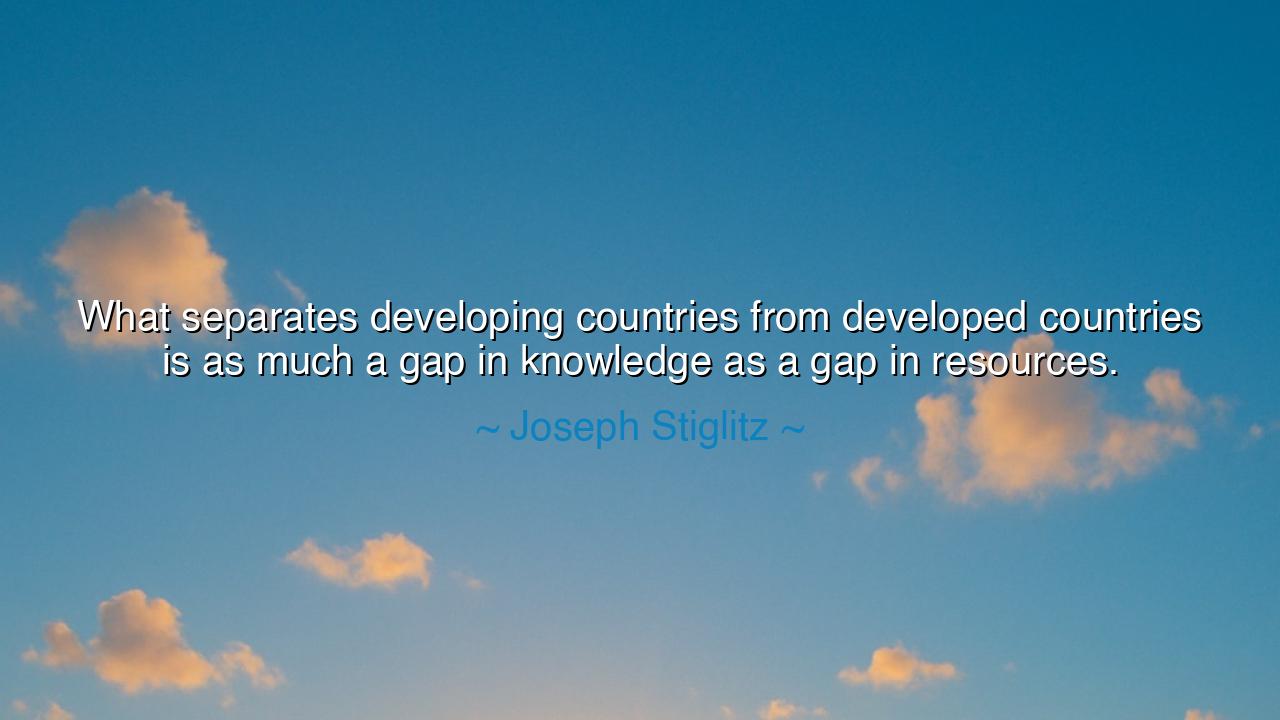
What separates developing countries from developed countries is
What separates developing countries from developed countries is as much a gap in knowledge as a gap in resources.






When Joseph Stiglitz, the Nobel Prize–winning economist, declared, “What separates developing countries from developed countries is as much a gap in knowledge as a gap in resources,” he spoke with the clarity of one who had peered deeply into the heart of nations and seen what truly sustains prosperity. Beneath his words lies a truth older than empires and wiser than gold—that knowledge, not wealth alone, is the root of enduring progress. Resources may feed a nation for a season, but knowledge builds civilizations that endure for centuries. To Stiglitz, the path from poverty to prosperity is not paved merely with money or minerals, but with education, innovation, and understanding—for it is the mind, not the mine, that holds the real treasure of a people.
To grasp the origin of this wisdom, we must look to Stiglitz’s life and work. As Chief Economist of the World Bank and a scholar of global inequality, he studied the forces that shape economic destiny. He saw that nations rich in natural resources often remained poor in development, while nations poor in land or oil—like Japan or Singapore—rose to greatness through the power of human intellect. His words emerged not from theory alone, but from witnessing how the spread—or the suppression—of knowledge determined the fate of entire peoples. He revealed an uncomfortable truth: that the divide between nations is not simply between those who have and those who have not, but between those who know and those who do not yet know.
When Stiglitz speaks of a “gap in knowledge,” he is pointing to the invisible barrier that shapes the visible world. This gap is not merely in education, but in access—to information, to technology, to methods of governance, to ways of thinking that unlock progress. Where knowledge flows freely, creativity flourishes and economies grow. Where ignorance is allowed to settle, innovation withers, and nations fall behind. Consider South Korea in the mid-20th century: after the devastation of war, it had little wealth, few natural resources, and almost no industry. But it invested in education, building schools, training teachers, and fostering scientific research. Within two generations, it transformed itself from one of the poorest nations on earth into one of the most advanced—proof that knowledge is the most powerful form of capital.
Contrast this with nations that possess vast natural wealth but lack the institutions to cultivate learning. The earth beneath them is rich, but their people are poor. This is the tragedy Stiglitz warns of—the resource curse, where abundance blinds a nation to the true source of prosperity. Nigeria, for example, holds immense oil reserves, yet struggles with poverty and inequality, while nations with fewer natural gifts, like Finland, thrive through innovation and education. The lesson is as sharp as it is ancient: resources can be stolen or exhausted, but knowledge multiplies when shared. The wealth of the earth fades, but the wealth of the mind endures and renews itself endlessly.
The ancients, too, understood this law. In the golden age of Athens, the city had neither great fields nor fertile plains, yet it became the cradle of Western civilization. Its philosophers, teachers, and artists turned thought into wealth, building temples not merely of stone, but of ideas—democracy, reason, and art. Similarly, during the Islamic Golden Age, centers of learning like Baghdad and Córdoba gathered scholars from across the world, preserving and expanding knowledge in medicine, astronomy, and mathematics. Their power did not lie in conquest or resources, but in the wisdom they cultivated and shared. From this, Stiglitz’s insight flows naturally: a nation’s greatness is not measured by what lies beneath its soil, but by what lives within its people.
The message of this quote reaches beyond governments and economies—it speaks to every individual. Just as nations rise through knowledge, so too does the human spirit. The difference between stagnation and growth, between mediocrity and mastery, is often not talent, but learning. The man or woman who hungers to know, who reads, studies, listens, and observes, grows rich in ways no currency can measure. Knowledge gives birth to vision, and vision transforms not only the self, but the world around it. This is why Stiglitz’s words carry such moral weight: they remind us that ignorance is not merely an absence of learning—it is a barrier to freedom.
Let the lesson then be spoken plainly: invest not only in things, but in minds. Build schools before fortresses, libraries before palaces, teachers before armies. For every book opened, every child taught, every mind awakened narrows the gap between despair and dignity. A nation that neglects education plants the seeds of its own decline; a people that prizes knowledge sows the future of its prosperity. And for each of us, the same law holds true—seek to know, for in knowing, you grow.
Thus, in the light of Joseph Stiglitz’s wisdom, we are reminded that the destiny of humankind is written not in the wealth of its soil, but in the enlightenment of its spirit. The world will always have unequal resources, but it need not have unequal knowledge. Let us therefore become stewards of understanding, guardians of truth, and teachers to the generations that follow. For when the mind of one child is lit with learning, the fate of a nation begins to change—and when the world learns together, the gap that divides us all begins to close.






AAdministratorAdministrator
Welcome, honored guests. Please leave a comment, we will respond soon